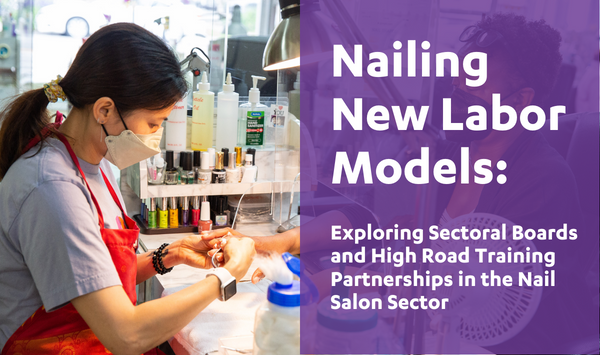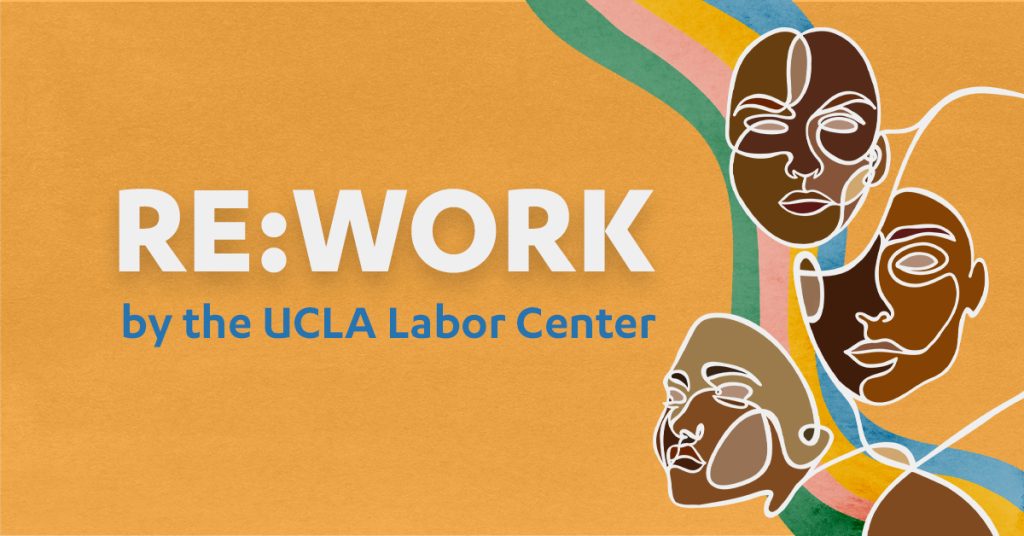Nail salons are a multi-billion dollar industry in the United States, and are primarily owned and staffed by immigrants and refugees. The sector is a small business one; the majority of salons having five or less employees. Low wages, wage theft, and misclassification, coupled with health and safety issues, remain prevalent in the industry. To address these dynamics, labor standards need to be lifted across the sector as a whole, rather than on a store-by-store basis.
Nailing New Labor Models explores two approaches, High Road Training Partnerships (HRTPs) and sectoral boards, to addressing workplace conditions, job quality, and climate resilience in sectors where unionization and/or industry-wide changes are difficult. Through four in-depth interviews with expert community and union partners who have implemented these models, our report considers the opportunities and challenges in implementing these models for nail salon worker organizing and advocacy. We further assess their applicability and feasibility for the nail salon sector through four focus groups with nail salon workers and owners in California and Massachusetts.
The report also functions as a “how to” for nail salon worker advocacy organizations: it examines pathways forward and prior lessons learned in order to develop partnerships among high road employers, worker organizations, and other industry stakeholders. Ultimately, this report weighs what partnerships and/or sectoral boards can be forged to build a sustainable and equitable nail salon industry.
Among other findings, the report notes:
- HRTPs have inclusive leadership, are worker-centered, and advance equity and job quality. In focus groups, workers and owners provided feedback on the need to identify industry leadership, form a partnership with multiple stakeholders, and create workforce development programs and promoting industry growth.
- Wage boards and labor boards bring together a range of representatives, can engage the broader community, and can promote consensus building. In focus groups, workers and owners provided feedback on the need to focus committee work to change industry issues, form a committee or council, and be attentive to concerns about power dynamics.
Authors recommend:
- Support Workers and the Nail Salon Workforce: through training programs and pathways for workers to increase workplace and life skills and provide opportunities for wage increases. It is also important to safeguard worker’s rights by protecting minimum wage, overtime pay, paid sick leave, and meal breaks through enforcement of labor laws, and curtail misclassification.
- Develop High Road Nail Salon Businesses: by creating training programs on how salon owners can develop high road infrastructure, and how to run sustainable, healthy, and just businesses. Create industry-specific programs and grants for the nail salon sector recovery planning. We also recommend ongoing consumer education campaigns so that the public learns about the importance of fair prices for nail salon services.
- Continued Research: For HRTPs, continue to understand how a model could be deployed for organizations that are not a union and for an industry without large companies or chains. For sectoral boards, assess how the new fast food wage councils in California and the Nail Salon Minimum Standards Council in New York will work. To understand how to better scale these approaches, assess whether a regional partnership is better in scale to start an HRTP, and how an HRTP could build off existing Healthy Nail Salon Recognition programs. For sectoral boards, research the possibility of either local and state-wide scale and scope of wage councils based on the state, and that would best benefit the nail salon sector.
Related Reports
Reopening During COVID-19: The Experience of Nail Salon Workers and Owners in California
Nail Files: A Study of Nail Salon Workers and Industry in the United States
A Survey of Nail Salon Workers and Owners in California During COVID-19


